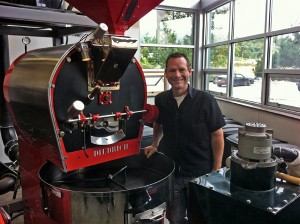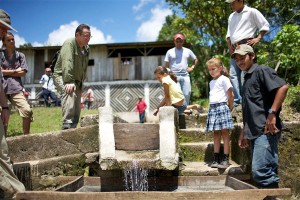From its picturesque location at the end of Washington’s State Route 532, things are looking good at Camano Island Coffee Roasters (CICR). Founded in 1999 by Jeff Ericson and his nephew Dan, it all started with a one-pound roaster in a barn. Today, the company is doing business in 32 countries and as part of its recent ecommerce launch, signed contracts to sell its beans via drugstore.com, amazon.com, and Costco.com.

Spend a few minutes talking to Jeff Ericson, though, and you will soon understand that Camano Island Coffee Roasters is not a coffee company. He started CICR, he says, because he wanted to do business differently – make a lot of money, yes, but also have a positive impact in the world. He chose coffee as the vehicle based on the fact that it is the second most-traded resource in the world, after oil.
For Ericson, coffee is fuel, too. Instead of powering shareholder profits, however, it is an energy source that can level the global economic playing field, and facilitate the kind of empowerment that leads to hope and prosperity in the developing world.
When CICR first entered the marketplace, the sustainable business concept of fair trade had already been around for a number of years. Growers are paid more than current market prices for their crops, usually in exchange for lowering the environmental impacts of their farms. Designed to create better trading conditions for producers in developing countries, the fair-trade system’s overall effect on poverty has been difficult to gauge as few formal impact studies have been conducted. And while CICR supported the practice of buying at fair trade prices from the outset, Jeff Ericson aspired to take it a step further
Ericson wanted to flush the company’s profits back out into the world, as he put it, in a way that incorporated a holistic solution to address generational poverty in the coffee growers’ villages. Doing research prior to the start of CICR, he happened upon an organization called Agros International. Not only was it headquartered in nearby Seattle, Agros’ approach differed from many other non-profit organizations in that it didn’t give handouts. Rather, it taught skills, and required hard work and high levels of commitment of its program participants.

Agros has worked in villages throughout Central America since 1985, turning migrant laborers into landowning farmers through training and microloans. The first phase of their process concentrates on the family and land selection process. Agros signs the land deed, and then provides loans to the farmers that are paid off over a seven- to 10-year period. Having evolved into a more comprehensive program in the years since its inception, it also includes instruction in community organizing and leadership development, as well as the physical improvement of housing, infrastructure, and water sources. It’s a relational model, though, built on the trust and cooperation that arises out of kinship, so there is no quick in and out. “This is what a lot of non-profits miss,” says Ericson. “It takes time, but it works.” Eventually, villages “graduate” from the program, and Agros’ direct financial support ends.
Ericson saw the potential for a partnership: not only could he source his organic, shade-grown, fair-trade coffee from the farmers in the Agros program, he could also plow profits back into the process by writing checks directly to Agros International. Currently, one dollar from every bag of coffee he sells goes to Agros. While he chose not to disclose how much he’s donated so far, “the number is big,” Ericson said.
In the 42 villages across Central America where Agros and CICR have partnered, this steady supply of funding has made an enormous difference, said Cathy Reilly, Agros International’s donor relations manager. “What they provide is a way of continuing a lot of the services and training.”
Reilly lauds CICR’s long-range view and long-term commitment to the villages and how social enterprise was incorporated into their business model from the outset. It also helps that Jeff and Dan Ericson have made visits to some of the communities, and “understand that the nature of the work can have its ups and downs,” Reilly said.
Challenges notwithstanding, on a visit to Nicaragua last year, Jeff Ericson was struck by the way that the villagers work together and operate as a cooperative. “We pick as one,” a community leader told Ericson. They also make empowered decisions as one. Instead of redistributing some recent profits, one village turned its focus to investment opportunities that would benefit its inhabitants and opted to build a new school.
Back in Washington, Camano Island Coffee Roasters is exceeding its growth targets, says Ericson, and is profitable at the same time that it works to create a positive social impact. For his part, he makes sure to tell the story of the Central American farm families to all of CICR’s business affiliates. By “shining a positive light” on their progress — a consistent theme in his approach to both business and life — Ericson said he has witnessed his partners internalize the human aspects of the business and adopt CICR’s principle of empowering their suppliers. He also tries to give the company’s consumers “the taste of place,” that is, to help them connect the dots with regards to the story behind their purchase, and demonstrate that there is more to corporate value than shareholder return.
Despite all of CICR’s involvement in Central America, when Ericson visits the villages in which they do business, “people don’t cry and thank you to death,” he said. Instead, they are “proud and puffed up” from what they have accomplished through their hard work. Even more important, he adds, they have hope.
Ironically, the increased empowerment of the village cooperatives can sometimes mean that they will negotiate a little harder than they did before. If other businesses are willing to pay more for their coffee, the farmers will sell to those businesses instead of CICR. That behavior is expected, though – it is a free market, after all. The job at the end of the day, Ericson said, is to walk away as friends. Friends, colleagues, or business partners; whatever term is used to describe these relationships, they have moved far beyond the lopsided association that has traditionally defined the coffee grower/seller supply chain.

